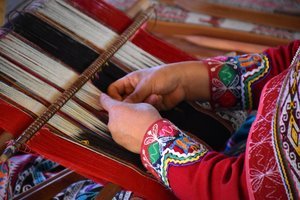How to Find and Work with Ethical Manufacturers
In working with over 30 artisan vendors as a production manager, I have been able to experience many of the successes and challenges in working with these production partners.
When challenges arise, many of the solutions I use may be different than what is practiced in traditional production. There is more innovation inherent in this style of production, especially when operating under principles of sustainability.
How to Partner with Sustainable Manufacturers
Now that you’ve located an ethical manufacturer, how can you best partner with them for success? In addition to wanting a successful product launch, most brands want to create meaningful work for artisans while producing top quality products. It can be quite the learning curve to navigate a partnership with a vendor, especially if you have not ventured to this less standard method of manufacturing before.
As this marketplace continues to thrive, there are a few key business practices that can foster sustainable business growth for any brand wanting to provide artisan products.
1. Understand the Craft
Once you know the products you would like an artisan vendor to supply, it can be easy to rely on their expertise for production. However, there are benefits for having a basic knowledge of materials and techniques which can aid in multiple facets of the supply chain.
During the development phase, knowing the techniques used to create the designs can make communicating with artisans a much easier process. Understanding limitations as well as ways to build upon techniques will help your product stand out in the marketplace.
As the product moves to production, understanding what contributes to lead times will reduce unforeseen delays before launch. The best way to learn about the production is to visit artisans and see the process first-hand. Even if you are not able to visit artisans in their home country, it is worthwhile to do research on your own to determine the basic techniques used in your production.
2. Communicate with Transparency
It is the nature of any successful partnership that communication between two partners is strong. In working with artisans, it is especially important to be clear and direct with all communications to minimize confusion across language and cultural barriers.
Conveying design specifications, deadlines, etc. can all be challenging when working internationally. Having regular touch points during development and production can quickly eliminate miscommunication. Utilizing Skype or WhatsApp are convenient and easily accessible tools for everyone to stay on the same page.
In addition, having transparency with your business goals can be beneficial for mutual understanding. Artisan vendors will work towards price points, quality specifications and deadlines when they have a clear idea of what your expectations are.
Simple updates on best-selling items and customer reception go a long way. Keep in mind that both parties stand to gain growth in their business from a meaningful partnership.
3. Be Flexible with Expectations
As is the nature of any business, there are always unexpected obstacles that arise during any part of the development or production phase. What makes the artisan industry unique is that there are additional factors to consider that may not affect traditional manufacturing.
When working with handmade goods, longer lead times are often normal. For example, handmade textiles can take up to 90 days alone before cutting and sewing can even begin.
Weather can also play a role in production for many artisan vendors. In Asian countries, monsoon seasons pose a regular delay for several months out of the year. Some of these delays are to be expected and you should always plan to have a longer lead time when working with artisan partners.
Even with planning ahead, there may still be unexpected delays that may postpone launch dates. If you maintain strong communication with your artisan vendor, it can be easy to make minor adjustments to your original scheduling.
4. Lean into the Partnership
Business relationships with artisan vendors may mean working more hands on than traditional manufacturing to achieve successful production. If you choose to partner with a smaller artisan vendor, your business may be the first international order they’ve ever received. This means that not only are you working to build your own business, but you also have a hand in growing theirs as well.
Certain milestones like getting an export license or finding material connections for bulk orders might be something they have never had to do. Luckily in this industry, the idea of partnership goes beyond working with artisan vendors.
From small boutiques to large wholesalers, there is much insight brands can learn from others who have begun to offer more artisan made products. Connecting with other businesses is easy through online communities and various annual conferences specifically geared toward the artisan production sector.
Another great resource is partnering with experts in the field, like Alice James Global, that has years of experience working both in the traditional retail and artisan industries.
Whether it’s your first or tenth time working with artisan vendors, employing these tips can ensure your product offerings are delivered on time, to the level of expected quality, and at a price point that’s workable for both parties.
Guest Contributor: Brie Anna Faye
Brie has worked in many capacities in sustainable development for the past 10+ years including providing insight to strategic social-impact and capacity building initiatives for artisan partners through Fair Trade principles. She has worked extensively in product development, production and marketing to ensure artisan and traditional craft products are successful in western markets. In 2018, Brie created the Ethically Curated blog providing education to consumers on how their values can impact their daily purchases.



